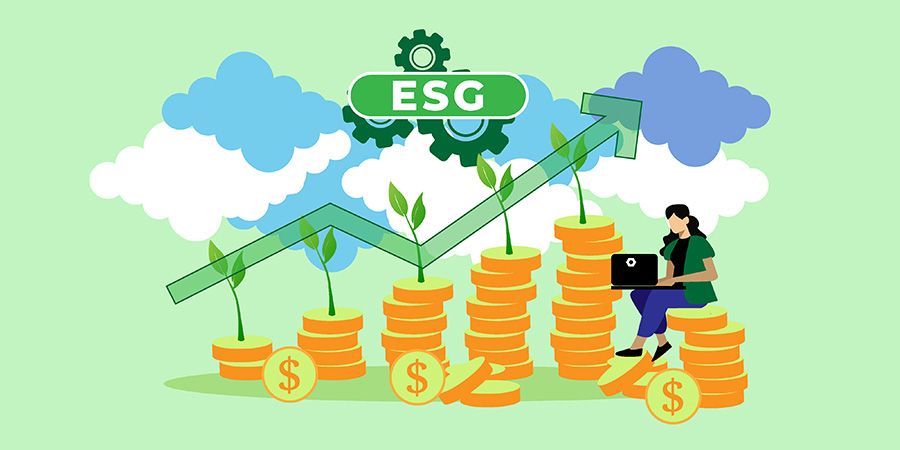Investing that promotes the best environmental, social, and governance (ESG) elements or outcomes is referred to as ESG investing” (also known as “socially responsible investing,” “impact investing,” and “sustainable investing”). ESG investing is frequently referred to as “sustainably” investing, in which investments are made while considering the economy, the environment, and human welfare into mind. It is founded on the expanding premise that environmental and social concerns have an increasing impact on an organization’s financial success.
ESG investing’s guiding ideas are not novel. Investment choices were affected by religious and moral convictions hundreds of years ago. Muslims created investments that abided by Sharia law, which forbade the use of firearms. Quakers and Methodists created the first ethical unit trusts in the UK and the US. Investor awareness of ethical market participation has grown as corporate social responsibility (CSR) and social sustainability gain popularity today. Following the publication of the Principles for Responsible Investments (PRI) in 2006—a collection of United Nations principles for the adoption of ESG considerations into company policy and strategy—ESG investing may have formally entered the mainstream of investment debate. The PRI, which has more than 2,000 signatories, is widely regarded as the definitive reference point for everything related to ESG investment.
What Is the Process of ESG Investing?
The ESG approach involves making investments in businesses that receive high marks from independent, third-party research organizations and firms on their environmental and social responsibility measures.
Hank Smith, Head of Investment Strategy at The Haverford Trust Company, explains that the fundamental goal of ESG investing is to improve one’s ability as an investor while effecting good social change.
Smith claims that ESG investment makes the assumption that a company’s performance will be impacted by a number of environmental, social, and corporate governance variables. Investors that take into account ESG concerns receive a more comprehensive understanding of the businesses they support, which may help reduce risk and spot possibilities.
Three factors are used to assess businesses for ESG investing:
Environment
What type of environmental effect does a corporation have? This might include a company’s supply chain sustainability initiatives, harmful chemicals used in its production processes, and its carbon impact.
Social
How can the business strengthen its social influence both internally and externally? Social variables range from recruiting procedures and inclusion initiatives to ethnic diversity in the executive suite and across the whole staff. Even how a firm promotes societal progress outside of its own field of expertise is examined.
Governance
How do the board and management of the organization promote good change? Governance covers a wide range of topics, such as CEO compensation, leadership diversity, and how well that leadership communicates with and engages with shareholders.
ESG investment, which is more than just a three-letter acronym to many people, focuses on how a company treats all of its stakeholders, including its employees, customers, communities, shareholders, and the environment.
“Identifying the impact, positive or negative, on these five stakeholders should become the measuring stick for quality ESG investing,” asserts Mike Walters, CEO of USA Financial. This is crucial for each stakeholder’s visible influence, but it may also be used to gauge the strength and viability of the business as a whole.
According to Walters, businesses that make the effort to balance the interests of each of their five stakeholders essentially develop into well-run businesses. And successful businesses become profitable stocks.
Benefits of ESG investments

ESG offers additional strong advantages over a more sustainable investing strategy.
Possibility of large returns
From 2004 to 2018, the overall returns of sustainable mutual and exchange-traded funds were comparable to those of standard funds, according to a 2019 white paper from the Morgan Stanley Institute for Sustainable Investing. ESG investments can outperform traditional ones, according to other studies.
Companies are ranked by JUST Capital according to criteria including whether they make fair salary payments or adopt environmental protection measures. Based on those rankings, it developed the JUST U.S. Large Cap Diversified Index (JULCD), which contains the top half of the Russell 1000’s large-cap stock index constituents. In comparison to the Russell 1000’s return of 14.76% during its entire history, the index has returned 15.94% on an annualized basis.
lower danger
No matter the asset class, the same Morgan Stanley analysis discovered that sustainable funds consistently had a lower downside risk than conventional funds. According to the study, traditional funds had a bigger possibility for loss since they had a considerably larger negative deviation than sustainable funds during periods of market turbulence like those in 2008, 2009, 2015, and 2018.
Even in 2020, ESG funds were able to achieve solid returns. 24 of the 26 sustainable index funds that Morningstar, a business that does invest research, examined in April beat equivalent conventional funds in the first quarter of 2020 (the start of the COVID-19 epidemic).
Examples of ESG investments
ESG investing may take many different forms, such as purchasing a stock with a good ESG score or investing in an ESG fund. From our list of the top ESG funds, below are a few instances of ESG investments:
- 1919 SSIAX: Socially Responsive and Balanced
- Investor in Parnassus Core Equity (PRBLX)
- Institutional Pax Large Cap Fund (PXLIX)
- MSCI USA ESG Select ETF (SUSA) from iShares
- Better World International I (TBWIX) by Thornburg
Influence Investing
Impact investing places greater emphasis on intent than it does on profits. Impact investing involves making investments in market sectors devoted to resolving urgent global issues. These industries might include those advancing clean and renewable energy, housing equity, affordable and accessible healthcare, and more.
Four established recommendations for impact investing are available from the Global Impact Investing Network (GINN):
- Intentionality. The goal of investments is to influence favorable social or environmental change.
- investment with a projected return. Of course, investments should, at the very least, result in a return on investment.
- a variety of asset types and return expectations. Expectations of returns across different investment categories should be consistent. These returns may fall short of market rates.
- Impact evaluation. Investments should be exceptionally transparent so that investors can judge if their money is making a difference.
- Depending on the industry invested in, impact investing may produce lower returns than ESG owing to the compromises investors make to assist earlier-stage businesses in less developed regions. However, impact investing offers a more direct method of bringing about change through intensely targeted investments for investors who genuinely care about promoting social fairness.
FAQs
Is ESG investment beneficial?
On the other hand, the ESG sector claims that it aids in highlighting businesses that could be riskier than conventional investment standards alone might imply. Savings returns may become more consistent and secure as a result. Using an ESG perspective, it adds, may aid investors in identifying possibilities that are better and more lucrative.
Who founded ESG?
The United Nations Environment Programme Initiative used the term “ESG” for the first time in the Freshfields Report in October 2005.










Add Comment